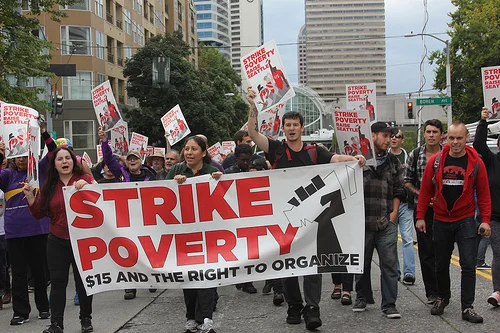Alaska Airlines, WA Restaurant Association failed to stop SeaTac City Council from sending living wage, paid sick leave to voters
SeaTac – July 23, 2013: More than 250 SeaTac voters, airport workers, and supporters celebrated the City Council’s unanimous vote to send the Good Jobs Initiative to voters later this fall. Earlier in the evening supporters had joyfully paraded from a nearby park to the SeaTac City Hall, where council members then took public testimony and performed a procedural vote to send the initiative to the fall ballot.
Corporate lawyers for Alaska Airlines and the Washington Restaurant Association failed to block today’s SeaTac City Council vote, despite filing a last second lawsuit in King County Superior Court and a challenge to the petition signatures. Alaska Airlines lost both attempts.
Residents, airport workers and service providers provided compelling testimony that Good Jobs will make SeaTac a better place to work and to do business (full testimony available upon request):
“A lot of my clients work at the airport for companies that contract to the big airlines, like Menzies, DGS, Airserve, and FSS. They all live in the SeaTac, Tukwila, Burien area. Most of them work for minimum wage. Some have been there for 2, 3 years still making $10 or so. Most of the people who come in from the airport instantly qualify for public assistance because they are supporting at least one other person – a child, spouse, elderly parent,” testified Taffy Maene, Board President of the United Territories of Pacific Islands Alliance, who also works as a public assistance provider.
“My students are part of families who are working local jobs… Without well-paying jobs they leave. The housing situation is particularly vital in establishing stability for these families. You are less likely to move away if you have a solid paying job in your own community,” testified Luis Escamillia, a local high school teacher and resident of SeaTac.
“I don’t have paid sick leave. If I have an emergency I have to take unpaid time off. If I take too much time off I’ll get fired. My husband works cleaning rooms at the downtown Westin Hotel even though he is old enough to retire. He keeps working so we can have health care. If my husband retires or if something happens, I won’t get my pills for my thyroid condition,” testified Evelyn Orlano, an airport worker who works two part-time jobs at the airport for minimum wage.
“When the Good Jobs Initiative passes, I won’t have to work so much overtime to make rent and I’ll have more time to spend with my daughter. I’ll be able to be a better dad,” testified Socrates Bravo, an airport worker who lives in a SeaTac apartment with another airport worker.
“A few years ago I worked as a short order cook at the Denny’s across the street. I’d work at Denny’s 7am – 2:45pm, take a quick sponge bath in the bathroom, brush my teeth, apply deodorant, then put on my bellman uniform and work from 3 – 11pm. If I have to get a second job to make ends meet on my minimum wage and tips, I wonder how employees at other hotels survive when those corporations are keeping their service charges and tips?” testified Tim Doherty, who has worked for 25 years as bellman at the Hilton Doubletree in SeaTac and is currently applying for a second, part-time job.
“I think the Good Jobs Initiative will make the City of SeaTac a better place to do business. That’s because more of the people shopping and living here will have more money to spend here in our shops,” testified SeaTac small business owner, Abdifatah Haashin.
“My hope is that with a livable wage our communities could be stabilized. Families could be under less stress. Parents would have time and the emotional availability to sit with their children, read to them, play with them, even attend school events with them – those things are missing in times of stress. My hope is that instead of a cup of noodles for breakfast or chips and soda for dinner - families could enjoy balanced meals that even contain vegetables,” testified Minister Jan Bolerjack, who runs the food pantry at the Riverton Park United Methodist Church.
The Good Jobs initiative, signed by more than 2,500 petitioners in SeaTac, provides targeted solutions for well-documented unfair working conditions at Sea-Tac Airport and in some of the larger airport-related businesses. (Alaska Airlines was recently punished withthousands in fines from the State Labor & Industries inspectors for allowing dangerous working conditions).
The SeaTac Good Jobs Initiative would bring Sea-Tac Airport in line with workforce standards already in effect at other west coast airports, as documented in the report Below the Radar issued in March 2013 by Puget Sound Sage.
The SeaTac Good Jobs Initiative would set basic employment standards for workers employed in the transportation, tourism and hospitality industries in SeaTac, including paid sick leave, full-time work for those who need it, a living wage of at least $15/hour, job security for employees when companies change contractors, and assurances that tips and service charges go to the workers who perform the service.
The measure would cover businesses in and around the airport, including airport baggage handling, passenger services, cabin cleaning, aircraft fueling, security, and retail stores, along with hotels, rental car and parking lot facilities. Small businesses and non-airport related businesses are specifically exempt.
###
















